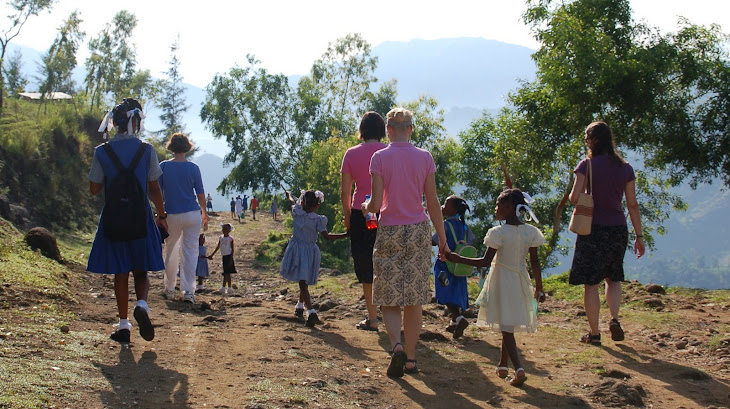 |
| artwork courtesy of Rev. Dr. Angela Yarber |
Then Jephthah came to his home at Mizpah; and there was his daughter coming out to met him with timbrels and with dancing. She was his only child; he had no son or daughter except her. When he saw her, he tore his clothes and said, “Alas, my daughter! You have brought me very low; you have become the cause of great trouble to me. For I have opened my mouth to the LORD, and I cannot take back my vow.” She said to him, “My father, if you have opened your mouth to the LORD, do to me according to what has gone out of your mouth, now that the LORD has given you vengeance against your enemies, the Ammonites. And she said to her father, “Let this thing be done for me: Grant me two months, so that I may go and wander on the mountains and bewail my virginity, my companions and I.” “Go,” he said and sent her away for two months. So she departed, she and her companions, and bewailed her virginity on the mountains. At the end of the two months, she returned to her father, who did with her according to the vow he had made. She had never slept with a man. So there arose an Israelite custom that for four days every year the daughters of Israel would go out to lament the daughter of Jephthah the Gileadite. -- Judges 11:29-40 (NRSV)
Bible stories like today’s are the reason some people avoid church altogether. They’re also why many Christians dismiss the Old Testament (Hebrew Scriptures). Yet the God of Israel is also the God of Jesus. If we’re going to follow Jesus, we have to explore the Scripture he knew, even the difficult parts. We have to understand the Bible is less of a road map or an instruction manual, and more like a mirror that reflects the horror and hope of the human condition.
So far our series on Joshua and Judges has highlighted heroes of the faith. But Judges also mirrors the tragedy of human life with terrible stories of violence against women and children. To hear and tell stories of terror is to wrestle demons in the night. Where is God when the virgin daughter of Jephthah is sacrificed? Or when the unnamed concubine is raped, murdered, and dismembered? We struggle with God in our own pain. Today we’ll learn how these stories from the past may enable insight into the present, inspire repentance, and against all odds, yield new beginnings. I’m thankful to Jewish theologian Tikva Frymer-Kensky and Christian theologian Phyllis Trible for their faithful interpretations of these stories. Let’s pray together.
A cycle of violence
The deep irony in Jephthah’s story is his own broken past as a victim. His mother was a prostitute. His brothers rejected him and forced him out. Then the elders select him to lead the army against the Ammonites. Scripture says the Spirit of the LORD comes upon Jephthah. Rather than acting with conviction and courage, he responds with doubt and demand. Battle oaths were common in his day, but Jephthah makes a very strange one to God. If the LORD delivers the Ammonites into his hand, then he will sacrifice as a burnt offering the first thing to come out of his house. An animal? A servant? His own daughter? We now know the answer. With this vow, Jephthah unfaithfully binds God rather than embracing the Spirit. He is all about control, not courage. Notice God makes no reply for the remainder of the story.Jephthah wins the battle, and his one-and-only daughter comes forth from the home with timbrels and dancing. Jephthah is horrified. He has opened his mouth. Words, once spoken, cannot be taken back. The daughter insists he must pay his vow, even though he will pay it with her body. Blame overwhelms the victim as Jephthah bewails the calamity she brings upon him.
Before she fulfills her father’s vow, Jephthah’s daughter demands two months to wander the mountains with her friends and mourn her violent death and loss of a future. Notice this act becomes a ritual in memory of her. In a society where women had few choices, rituals from childhood to adulthood would be an opportunity to alleviate their anxiety or at least endure what life would hand to them in the control of fathers and husbands. But this story isn’t merely about ancient puberty rites. This story is about the appalling nature of child sacrifice. God’s people were sacrificing their children in this day, in spite of protests from prophets and priests. Horror toward child sacrifice is why we hear about this story. As listeners, we wait for the moment of salvation. Why doesn’t somebody stop the sacrifice and rescue the daughter? In the more famous story of the binding of Isaac, God intervenes at the last moment with a ram in the bushes. Where is the lamb for the slaughter? My God, my God, why have you forsaken her?
Where is God?
Jephthah’s daughter has every right to cry out to God. We can imagine God hears those cries and comforts her in the mountains with her friends. We can pray God gives her strength for the horror to come. One of my friends knows someone whose first experience with God happened inside a dark closet, where she would hide to escape her abuser. While many people would feel abandoned by God in those circumstances, this little girl very much felt the presence of the Holy One surrounding her and giving her the strength to go on, even in the darkest times.From the perspective of the authors of Judges, the book takes place in the darkest of times where God no longer intervenes to save individuals like in Genesis and Exodus. At this time, God is active on a national scale, bringing first conquerors and then redeemers. The world of the book of Judges is more like our world. God is present with us, but God is not a puppeteer. God gives us the freedom to choose, and sometimes we choose poorly. We become perpetrators of abuse. Or worse yet, we remain silent when it happens around us. We can’t expect God to appear to save family members when we endanger them or fail to speak out. In the absence of God’s direct intervention, human beings and their social system must prevent such horrors. Instead, we must ask: Where were we when these horrors happened?
- Where were we when 5 year-old Marie Pierre was abused to death by her cousins?
- Where were we when a 6-month-old was found to have a sexually transmitted disease?
- Where were we when a Ball State student was sexually assaulted, only to have her suspected rapist mistakenly released from jail a year ago? Where were we, church?
Where are we?
Violence and vengeance are not just characteristics of the pre-Christian past. They affect our communities today. Jephthah’s daughter and the unnamed concubine are the stories of many women, men, and children in our own community who have been offered upon the altar of our violence. We still sacrifice the most vulnerable among us -- sometimes by our direct action, but most often by our silence, especially in the church. To take to heart these ancient stories is to confess their present realities. These stories are alive, and all is not well. But our confession is only valid as long as it leads to repentance, to a literal “turning around” of our lives and communities so that we can say to every woman, man, and child who has been a victim: “Never again.”Ian Tolino has said “never again.” As a senior at the University of Maryland, he’s known around campus as “consent bro.” When he was a freshman, someone in his fraternity was accused of raping a woman. When someone displayed a T-shirt from his fraternity as part of a sexual assault awareness effort, he knew he needed to take action on behalf of his brothers. He now educates male peers across campus on respect, consent, and boundaries as part of the Campus Advocates Respond and Educate to Stop Violence. Ian has said, “Never again.”
One of my clergy colleagues has said “never again.” As a little girl, she was molested by a trusted member of her family. Wounded beyond belief, she has undergone years of therapy that has brought healing to much of her pain. She now lives in a town with few resources, and the closest domestic violence shelter is 45 minutes away. She’s been trained in crisis response, and the local hospital and police department call on her to be present with women and families in crisis. Her scars have given her a place to minister quietly and compassionately to those in pain until the day we all can say, “Never again.”
I wonder what “never again” looks like in your life. Perhaps you’ve been the victim of terrible abuse or assault. Please know we want to be part of your healing journey. Our prayer is you will find God right there with you, even in the darkest closet of your pain. Maybe you’ve been the perpetrator. We are people of forgiveness. We want to offer you God’s grace that calls you to turn your life around and begin again. Perhaps you’ve been the witness. We want you to help give you a voice to speak out. You’ll find community resources on the back of the bulletin to help you speak out. They will also help you share and serve until the day we all say, “Never again.”
Several hundred years after Jephthah’s daughter and the Levite’s concubine, God’s people were once again facing a very dark time in exile. The prophet Isaiah spoke a comforting word on God’s behalf: See, I am doing a new thing! Now it springs up; do you not perceive it? I am making a way in the wilderness and streams in the wasteland. (Isa 43:19) Light in the darkness. Hope in the horror. Healing in the pain. A new beginning for all of God’s children. Thanks be to God. Amen.







